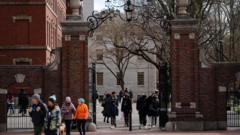The ongoing feud between the Trump administration and Harvard University escalated this week as Homeland Security Secretary Kristi Noem threatened to block the enrollment of international students if the university fails to provide comprehensive information about its visa holders. This move comes after Harvard's refusal to comply with demands for altering its admissions and hiring practices, showcasing the administration's escalating pressure on elite educational institutions. The demands not only focus on alleged illegal activities but also include broader anti-diversity measures and ideological audits of the student body.
Trump's Ultimatum: Harvard's International Student Enrollment at Risk

Trump's Ultimatum: Harvard's International Student Enrollment at Risk
The Trump administration issues a stark warning to Harvard University over international student data disclosure, signaling a broader conflict with elite institutions.
The latest communications from the Department of Homeland Security have painted a concerning picture for Harvard, with Noem's letter detailing requirements for Harvard to disclose the activities of every international student deemed involved in “known illegal” conduct. The ultimatum stipulated that non-compliance would be treated as a voluntary withdrawal from the visa program, jeopardizing the future of many students at the institution.
Amid these heightened tensions, the Trump administration has positioned its campaign against elite universities as a response to antisemitism on campuses. However, critics argue the broader implications target diversity initiatives and the ideological diversity of student bodies, suggesting the administration's goals extend beyond a mere crackdown on antisemitism.
Harvard's stance has not shifted, expressing commitment to its principles and policies and standing firm against the administration's aggressive tactics. As this confrontation continues, the implications for international students and the integrity of university policies are likely to resonate across the higher education landscape, raising questions about the future of academic freedom and institutional autonomy under political scrutiny.
Amid these heightened tensions, the Trump administration has positioned its campaign against elite universities as a response to antisemitism on campuses. However, critics argue the broader implications target diversity initiatives and the ideological diversity of student bodies, suggesting the administration's goals extend beyond a mere crackdown on antisemitism.
Harvard's stance has not shifted, expressing commitment to its principles and policies and standing firm against the administration's aggressive tactics. As this confrontation continues, the implications for international students and the integrity of university policies are likely to resonate across the higher education landscape, raising questions about the future of academic freedom and institutional autonomy under political scrutiny.






















